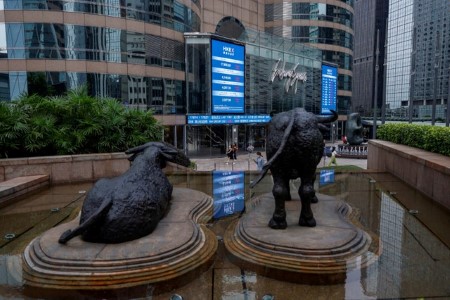




Inflation Update: Weak demand softens shocks
 DOWNLOAD
DOWNLOAD

Monthly Economic Update: Fed cuts incoming
 DOWNLOAD
DOWNLOAD

Consensus Pricing – June 2025
 DOWNLOAD
DOWNLOAD


TOP SEARCHES
China’s property support measures disappoint, developers’ shares falter

HONG KONG – Shares of Chinese developers wobbled on Monday as investors fretted that China’s “historic” steps to stabilize its crisis-hit property sector fell short of what is required to foster a sustainable turnaround in demand and confidence.
Hong Kong’s Hang Seng Mainland Properties Index closed down 0.7%, after having gained around 18% so far this month after the Politburo said in an April 30 meeting that it would coordinate to clear housing inventory.
Embattled state-backed developer China Vanke eased 0.2%, after bouncing as much as 6.4% in the morning session. Shimao Group, R&F Properties, Kaisa Group, and KWG Group were down more than 10% each.
China unveiled measures on Friday to facilitate up to 1 trillion yuan (USD 138 billion) in funding and ease mortgage rules, with local governments set to buy “some” apartments.
As part of those steps, the central bank said it would set up a 300 billion yuan (USD 41.49 billion) relending facility for state-owned enterprises (SOEs) to purchase completed and unsold homes at “reasonable prices” for affordable housing.
The central bank expects the relending program would result in 500 billion yuan worth of bank financing.
Friday’s announcement came after waves of policy support measures over the past two years failed to revive the sector, which at its peak accounted for a quarter of national GDP and remains a major drag on the world’s second-biggest economy.
While a housing ministry publication described the latest policies as a “historic moment” for the industry, many China watchers were more circumspect in their assessment.
Analysts said the central government’s decision to step in as a buyer marked an important step but noted that the size of financing on offer pales in comparison to the estimated trillions of yuan worth of housing inventory across the country.
There were 391 million square meters (4.2 billion square feet) of new housing for sale in January-April, up 24% year-on-year, the latest official data show, equivalent to 6.6 Manhattans Tianfeng Securities estimates it will cost around USD 1 trillion to buy the entire stock.
Bank of America head of Greater China property research, Karl Choi, noted that social housing programs are only mandated in larger cities, estimating that the 500 billion funding could purchase up to 15% of inventory in tier-2 cities at a deep discount.
Macquarie economists say Beijing’s previous statements suggested 18 months of inventory clearing may be the government’s policy goal, versus the current timeframe of 28 months to clear the stock.
Achieving the policy goal will cost an estimated 2 trillion yuan, they said.
“Given its limited size and the various challenges in execution, it alone is unlikely to solve the problem,” Larry Hu, the bank’s chief China economist said in a report. “But it’s encouraging that policymakers are moving in this direction after failures in the previous years.”
Analysts compared the latest 300 billion relending facility to another 100 billion yuan facility introduced in January 2023 for eight pilot cities to purchase inventory for subsidized rental housing. So far, only around 2 billion yuan have been drawn down by January this year, official data showed, highlighting the lack of incentives and participations from the market.
Local governments, already some USD 9 trillion in debt, may be reluctant to expand their social housing projects which provide low returns, and banks would also be hesitant to lend to potentially loss-making businesses.
Bank of America’s Choi also said the duration of this lending, designed to be a maximum of five years, is too short for the payback period for a rental housing project, which could be a concern for SOEs and commercial banks.
Goldman Sachs expected it would take nine months to stabilize China’s property prices if the government launches a full-scale program to reduce inventory.
“Much depends on execution,” the US investment bank said. “Despite policymakers signaling a more supportive stance, the effectiveness of any new measures will hinge on how quickly and easily they can be implemented.”
Reviving homebuyer confidence is still the key to a property recovery, analysts say.
Li Gen, chairman of Beijing G Capital Private Fund Management Center LLP, said few entities will be motivated by Friday measures under current market conditions.
“The demand for property is weak with many people concerned about jobs and incomes in future.”
(USD 1 = 7.2302 yuan)
(Reporting By Hong Kong and Shanghai newsrooms; Editing by Anne Marie Roantree, Shri Navaratnam, and Louise Heavens)
This article originally appeared on reuters.com





 By Reuters
By Reuters